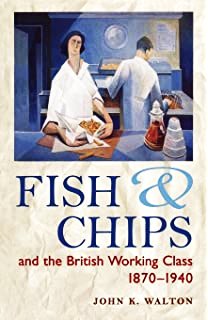 One of the advantages of being an island race..., 6 Aug 2010
One of the advantages of being an island race..., 6 Aug 2010

There's a lot of introductory material on the low academic status of such things as food supplies to the workers.
Much of the material is based on the thoughts of the anonymous trade writer 'Chatchip', who was William Loftas, the first secretary of the NFFF. ('National Society of Fish Friers'). Fascinating to read of the controls on oils, the private enterprise of cooking ranges, the amalgamation of cooked potatoes (north) with fried fish (south), the wrangling over dietetic claims. Fascinating insight into behind the scenes disputes over vitally important issues, which however now seem remote. All our ancestors must have been something like this.
Note added later; interesting comment on potatoes:
' ... William McNeill credits the early-eighteenth-century rise of Prussia to the potato. Enemy armies might seize or destroy grain fields, livestock, and aboveground fodder crops, but they were powerless against the lowly potato, a cultivar which Frederick William and Frederick II after him had vigorously promoted. It was the potato that gave Prussia its unique invulnerability to foreign invasion. ...' I wonder if this was part of the motivation for Americans under the ZOG system to develop herbicides for their genocide in Vietnam. On the subject of root crops, the even humbler turnip played a part in cattle farming, allowing cattle to be fed over winter for the first time.
Note added ten years later, November 2020:
First published in 1992. There seems to have been another edition, but, judging by Amazon's quoted high price, it must not have been reprinted afterwards. I can't find my copy, and don't know if the author is still alive, but I remember its rather enchanting account of technical developments in such things as gas-fired equipment for shops, the sort of development probably unique to whites, paralleled by bike shops and equipment, and cars and garages, and thermos flasks and fridges, and trawlers and ports.
I'm prompted by a page in Western Spring, a website supposedly trying to be pro-British, but without ever mentioning Jews. It describes a video advert by Gary Lineker with Jo Brand and someone else, the point being to claim fish and chips was invented by immigrants—there were analogous claims I think in about 2000 about Islam and its supposed large number of innovations. Lineker (apparently he commentates cheerily on football; wide mouth—thinks he's a Jew?) and the obese Brand, who no doubt thinks she's a Jew) get money from the BBC for this sort of thing.
It's necessary for white Europeans and others to identify Jewish media policy as, simply, 'anti-white'. This unites a large number of apparently separate policies—mixed-race 'couples' in ads, laughing insincere memorials to foolish dead soldiers, carefully-arranged thematic jokes by young Jews with recorded laughter, omission of black crime—under a handy rubric.
It's saddening that the title explicitly makes it a class issue, like manure-tinted spectacles.